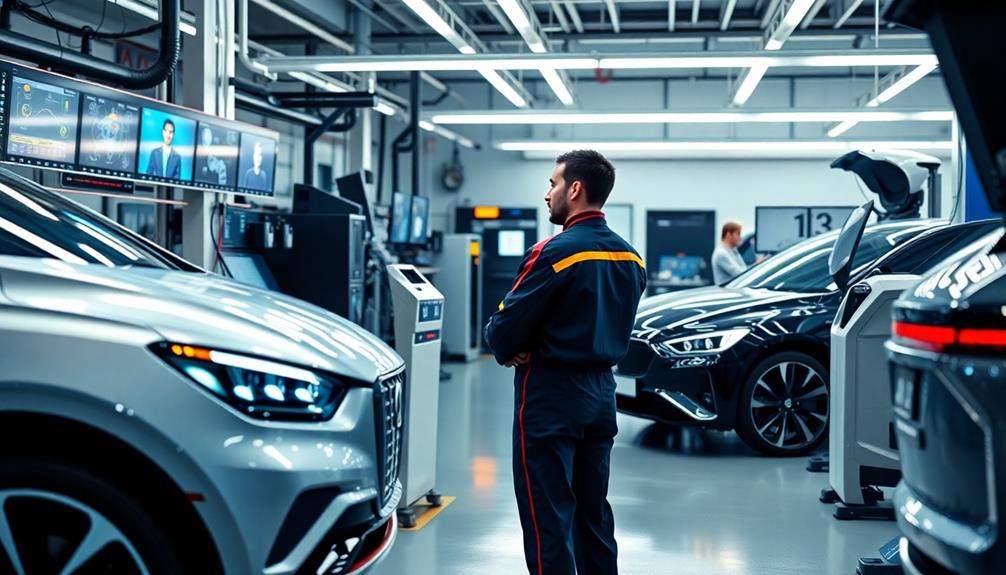A master technician has advanced training, more hands-on experience, and stronger diagnostic skills compared to a general tech. They excel at quickly identifying complex issues and handling intricate vehicle systems, making them ideal for difficult repairs. General techs are reliable for routine maintenance and basic diagnostics but may need guidance with more complex problems. To understand which professional suits your needs best, keep exploring the differences further.
Key Takeaways
- Master technicians have extensive training, certifications, and hands-on experience, handling complex diagnostics and repairs efficiently.
- General techs are skilled in routine maintenance and basic repairs but may need guidance on complex issues.
- Master technicians quickly identify and troubleshoot intricate vehicle systems, saving time and reducing costs.
- Customer communication by master techs is clearer, explaining complex issues in understandable terms, while general techs focus on standard explanations.
- For advanced or difficult repairs, a master technician is the better choice; general techs are suitable for routine work.

When choosing between a master technician and a general tech, understanding their differences is essential for making an informed decision. Both play crucial roles in automotive repair, but their skills and expertise levels vary markedly. A master technician has typically undergone extensive training, certification, and hands-on experience, which sharpens their diagnostic skills. This means they can quickly identify complex issues that might stump a less experienced technician. Their ability to interpret diagnostic tools and analyze intricate systems allows them to pinpoint problems efficiently, saving you time and money. On the other hand, a general tech is often still developing their diagnostic skills. They’re usually competent at handling routine repairs and basic diagnostics but may need more guidance when faced with complex problems. While they can perform standard maintenance and repairs, their troubleshooting might take longer, especially with unusual or complicated issues.
Customer communication also differs between these two roles. Master technicians tend to be more confident and articulate when explaining issues to customers. They can break down complex diagnoses into clear, understandable terms, which helps you better grasp what’s happening with your vehicle. Their experience allows them to manage customer expectations more effectively, providing reassurance and transparency during the repair process. In contrast, general techs might communicate less confidently or in more technical terms, which could be confusing if you’re not familiar with automotive jargon. They may also require more guidance from supervisors when explaining repairs, potentially leading to less clarity for you. However, both types of technicians aim to keep you informed, but a master technician’s communication generally reflects their higher level of expertise.
When weighing your options, consider that a master technician’s advanced diagnostic skills and superior customer communication can be invaluable, especially if your vehicle has complex or difficult-to-diagnose problems. They’re better equipped to handle intricate systems and provide detailed explanations about repairs. Meanwhile, a general tech can handle routine maintenance reliably and at a potentially lower cost. If your vehicle only needs basic service or routine repairs, a general tech might suffice. But for more complicated issues or peace of mind, opting for a master technician can ensure you get the most accurate diagnosis and clear communication. Ultimately, understanding these differences will help you select the right technician for your needs, ensuring your vehicle receives expert care and you stay well-informed throughout the process.
Frequently Asked Questions
What Certifications Distinguish a Master Technician From a General Tech?
A master technician holds advanced certifications that distinguish their skill level from a general tech. These certification differences often include specialized industry credentials, such as ASE Master Certifications, which demonstrate thorough knowledge and expertise. You can see these skill level distinctions in their ability to diagnose complex issues and perform advanced repairs. Achieving these certifications shows your commitment to excellence and sets you apart as a highly skilled professional in the automotive field.
How Does Experience Impact the Roles of Master Technician Versus General Tech?
Experience is like a toolbox that shapes your role, whether you’re a master technician or a general tech. With more hands-on training and skill development, you gain deeper understanding and problem-solving abilities. As you accumulate experience, you’ll handle complex repairs faster and more efficiently, elevating your expertise. This hands-on learning not only boosts your confidence but also helps you advance to higher certifications and responsibilities, defining your career path.
Are There Specific Industries Where One Role Is More in Demand?
In specialized fields like aerospace, healthcare, or advanced manufacturing, the demand for master technicians is higher because their expertise is vital. Conversely, general technicians are more sought after in industries with broad maintenance needs, such as automotive or facilities management. Your skills align with industry demand, so if you excel in a niche, you’ll find more opportunities. Focus on gaining specialized training to increase your employability in high-demand sectors.
What Career Advancement Opportunities Exist for Master Technicians?
Think of your career as a ladder—each rung representing growth and skill development. As a master technician, you can climb into supervisory roles, specialized expert positions, or even training and management careers. Your skill growth unlocks opportunities in leadership, certifications, or consulting. Embrace continuous learning to expand your expertise, making you indispensable and opening doors to higher wages, responsibilities, and a lasting impact in your industry.
How Do Salary Ranges Typically Compare Between the Two Roles?
You’ll find that salary comparison shows master technicians generally earn more than general techs, reflecting their advanced skills and expertise. Compensation differences are significant, with master technicians often receiving higher wages, bonuses, and incentives. Their specialized knowledge and certifications boost their earning potential, making them more valuable to employers. If you’re aiming for higher pay, pursuing mastery and additional certifications can help you move into roles with better compensation opportunities.
Conclusion
Think of a master technician like a skilled chef, mastering every ingredient and technique, while a general tech is more like a home cook with basic skills. I once saw a master tech fix a complex engine issue in half the time it took a general tech, saving the customer time and money. Choosing a master technician means trusting someone who has the expertise to handle the toughest problems — just like a chef who knows every secret ingredient for a perfect dish.









